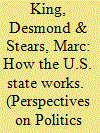|
|
|
Sort Order |
|
|
|
Items / Page
|
|
|
|
|
|
|
| Srl | Item |
| 1 |
ID:
165562


|
|
|
|
|
| Summary/Abstract |
Will the British welfare state revert to an Americanisation trajectory or retain features of the European model after April 2019? After a period of historically prolonged austerity and substantial working age welfare reform, with the UK facing yet another renegotiation of the social contract in a post‐Brexit world, the question of whether there remains space for an alternative to the ‘American’ model is of crucial importance. We argue that there has been a blurring of differences across the American and European welfare states in terms of working age benefits, as most countries have adopted aspects of work‐based conditionality reforms, which attach the receipt of benefits to the active pursuit of work and, to varying extents, the underlying politics of US welfare reform, where there are large coalitions supportive of more punitive policies towards low‐income adults and minorities. These trends are taking place against the backdrop of a second major shift: increasing restrictions on benefits for immigrants. This double narrowing of the welfare state, making benefits conditional for citizens and excluding those who are not citizens, seemingly sets the agenda for a more restrictive post‐Brexit welfare state. The experience of the last two decades suggests, however, that the adoption of the American model has not been wholesale; steering a middle path between punitive conditional American benefits and more traditionally generous universal benefits is on the agenda across advanced welfare states.
|
|
|
|
|
|
|
|
|
|
|
|
|
|
|
|
| 2 |
ID:
092532


|
|
|
|
|
| Publication |
2009.
|
| Summary/Abstract |
The American economy and financial system is experiencing upheaval on a scale not seen since the Great Depression of the 1930s. A number of the largest and most established banks and investment firms have declared bankruptcy (including Bear Stearns and Lehman Brothers) or been taken over at fire-sale rates (as was the case, for example, with Merrill Lynch). In the fall of 2008, Congress and the U.S. Treasury along with the Federal Reserve Bank committed more than eight trillion dollars in payments, loans, and guarantees of various sorts to prop up financial institutions (including the semi-governmental mortgage entities, Fannie Mae and Freddie Mac) as well as the country's largest insurer, American International Group (AIG). The speed, number, and scope of these interventions lack historical precedent.
|
|
|
|
|
|
|
|
|
|
|
|
|
|
|
|
| 3 |
ID:
165863


|
|
|
|
|
| Summary/Abstract |
It is commonplace to equate the arrival of a new conservative administration in Washington, DC, with the “rolling back” of the federal activities. We disagree with this conventional perspective, and seek to demonstrate that the equation of conservative Republicanism and retrenchment elides a critical change in the relationship between party politics and State power—a relationship that Donald Trump seems determined to nurture. Drawing on primary research, we argue that partisanship in the United States is no longer a struggle over the size of the State; rather it is a contest to control national administrative power. Since the late 1960s, conservative administrations have sought to redeploy rather than dismantle or roll back state power. Through “redeployment,” conservative presidents have sustained previous levels of State spending or State activity, but in a way reflecting a new administration’s ideology.
|
|
|
|
|
|
|
|
|
|
|
|
|
|
|
|
| 4 |
ID:
110950


|
|
|
|
|
| Publication |
2011.
|
| Summary/Abstract |
Many existing accounts of the American state search for identifiable features of stateness recognizable from the comparative politics of state theory. These are less present in the US because of a distinct history, institutional separation of powers, and an ideological populism based in opposition to public sector expansion. Despite these constraints the American state is a powerful actor in US politics and has been since the nineteenth century engaged in familiar revenue raising, regulatory, public order, coercive, military, and distributive functions. To understand these we propose a framework based on how the endogenous drive to standardize shapes these functions and gives a distinct character to the American state. We identify impulses to standardize, instruments of standardization, and enduring obstacles to this agenda.
|
|
|
|
|
|
|
|
|
|
|
|
|
|
|
|
| 5 |
ID:
186651


|
|
|
|
|
| Summary/Abstract |
We document the broad patterns of COVID-19 as it affects minority communities. We present a theoretical framework rooted in Global North democracies’ racial and ethnic legacies to analyze the health and economic disparities between these communities and the white majority population. Marshalling first-cut empirical evidence from the United States, the United Kingdom, the Netherlands, and Sweden, we find patterns of the pandemic’s distribution consistent with how the burden of racial and ethnic legacies endures: people from minority communities have worse health and economic outcomes under normal circumstances, inequalities the COVID-19 crisis has exacerbated. The comparison shows that the impact of racial and ethnic discrimination on pandemic policy outcomes is not unique to the United States. Health inequalities stemming in part from patterns of institutional racism and discrimination perversely help reproduce these societal inequities. We find that governments’ initial responses have failed to mitigate the disproportionate impact of this health and economic crisis on minority communities because they did not acknowledge or address the particular challenges that these groups face.
|
|
|
|
|
|
|
|
|
|
|
|
|
|
|
|
|
|
|
|
|